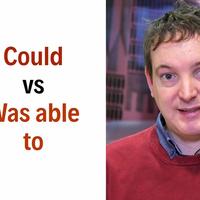Could vs Was able to - English In A Minute - YouTube
Could vs. Was able to - English In A Minute - YouTube
Could vs Was able to - Inglés en un minuto - YouTube
Could vs Was able to - English In A Minute - YouTube
できた vs した - 英語を1分で - YouTube
Could vs Was able to - Angielski w minutę - YouTube
Could vs Was able to - Inglês num minuto - YouTube
Could vs Was able to - English In A Minute - YouTube
Could vs Was able to - Bir Dakikada İngilizce - YouTube
Could vs Was able to - Англійська за хвилину - YouTube
可以 vs 能够 - 一分钟英语 - YouTube
可以 vs 能夠 - 一分鐘英語 - YouTube
When do we use 'could' and 'was able to' to talk about past abilities?
||||||||||||過去の|
'could' と 'was able to' を使って過去の能力について話すのはいつですか?
Khi nào chúng ta sử dụng 'could' và 'was could' để nói về những khả năng trong quá khứ?
If it's a positive sentence, ask yourself if it's a general ability - which uses 'could', or a specific achievement - which usually uses 'was able to'.
ポジティブな文であれば、それが一般的な能力('could'を使う)なのか、特定の成果(通常は'was able to'を使う)なのか自問してみてください。
Nếu đó là một câu tích cực, hãy tự hỏi liệu đó là một khả năng chung - sử dụng 'có thể' hay một thành tích cụ thể - thường sử dụng 'có thể'.
'I could run fast when I was younger.'
『若い頃は速く走ることができた。』
'Tôi có thể chạy nhanh khi tôi còn trẻ.'
'I was able to win a medal.'
||||||メダル
『メダルを獲得できた。』
'Tôi đã có thể giành được huy chương.'
But we do use 'could' for a specific event, if we use verbs related to senses or thought processes.
|||||||特定の|出来事|||||関連する動詞|感覚または思考|感覚||思考|思考過程
しかし、感覚や思考過程に関連する動詞を使用する場合、特定の出来事には「could」を使用します。
Nhưng chúng ta sử dụng 'could' cho một sự kiện cụ thể, nếu chúng ta sử dụng các động từ liên quan đến giác quan hoặc quá trình suy nghĩ.
'I could feel the wind in my face.'
「顔に風を感じることができた。」
'Tôi có thể cảm thấy gió phả vào mặt mình.'
'I could remember my coach's advice.'
||||コーチの|
「コーチのアドバイスを思い出すことができた。」
'Tôi có thể nhớ lời khuyên của huấn luyện viên của tôi.'
If the sentence is negative, it's much easier – we can use either.
|||||||||||entweder
文が否定的な場合は、どちらを使ってもはるかに簡単です。
Nếu câu ở dạng phủ định thì dễ hơn nhiều – chúng ta có thể sử dụng cả hai.
'I couldn't do much at school the next day.'
『次の日、学校ではあまりできなかった。』
'Tôi không thể làm được gì nhiều ở trường vào ngày hôm sau.'
'I wasn't able to concentrate at all!'
||||集中する||
『全く集中できなかった!』
'Tôi không thể tập trung chút nào!'
Negative or positive? Specific or general?
ネガティブですか、それともポジティブですか?具体的ですか、それとも一般的ですか?
Tiêu cực hay tích cực? Cụ thể hay chung chung?
Are there any senses or thought processes?
感覚や思考プロセスはありますか?
Có giác quan hay quá trình suy nghĩ nào không?
'What could you do when you were younger?'
若い頃には何ができましたか?
'Bạn có thể làm gì khi còn trẻ?'
'What were you able to achieve?'
何を達成することができましたか?
'Bạn đã đạt được điều gì?'
'What could you see or hear while you were doing it?'
『それをしている間、何が見えたり聞こえたりしましたか?』
'Bạn có thể nhìn thấy hoặc nghe thấy gì khi làm việc đó?'

